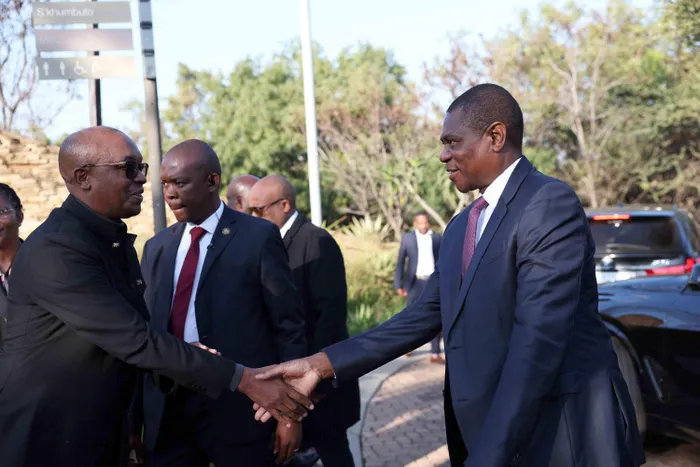Transformation Fund: Fixing apartheid-era policy distortion

Parks Tau, Minister of Trade, Industry and Competition (left) and Deputy President Paul Mashatile ahead of a business briefing on the Transformation Fund held at the Freedom Park Heritage Site and Museum in Pretoria on May 5, 2025.
Image: GCIS
Parks Tau
In 1994, South Africa inherited an economy that was structurally designed to exclude the vast majority of South Africans. Apartheid’s distorted policies had created a dual economy: one of wealth and privilege and another of poverty and exclusion.
This calculated economic strategy, structured along racial lines, created white-owned mines, farms, and factories. At the same time, many black South Africans languished on the fringes of the economy in an underdeveloped informal sector.
Their meaningful participation in our nation's wealth was further eroded by discriminatory laws that restricted Black South Africans from owning land, accessing quality education, and entering skilled professions.
These economic distortions, which were implemented over hundreds of years, continue to plague our nation today as we grapple with one of the highest levels of economic inequality in the world, worsened by alarmingly high unemployment, especially among Black youth.
The country’s Gini coefficient of 0.63 shows that our nation’s income remains unevenly distributed, with the top 10 per cent of the population holding more than 85 per cent of household wealth. This persistent disparity undermines the development of an inclusive economy where all citizens participate and benefit.
The transformation we seek is about positive change and is the only logical path to long-term growth and the reduction of inequality. In deracialising ownership across our economy, we open more opportunities for black people, in particular women and the youth.
While the Constitution guides our work in creating a society with equal opportunities, we require a deliberate removal of structural obstacles to draw more people into the economy and mechanisms that advance our constitutional commitment to economic redress and transformation.
In this regard, the government plans to introduce the Transformation Fund to help level the economic playing field for emerging Black businesses, particularly those in key economic sectors such as manufacturing, agriculture and tourism who struggle to secure funding due to stringent lending requirements.
The fund will provide financial support, infrastructure and capacity-building to Black-owned businesses – in particular Small, Medium and Micro Enterprises, women and youth entrepreneurs, and people living with disabilities - who are often locked out of meaningful economic participation due to their lack of access to capital.
In fostering greater access to capital, business owners can invest in equipment, hire skilled staff, expand into new markets and ultimately quicken the pace of transformation in South Africa's economy. It is also expected to stimulate meaningful economic activities across all regions of our country.
A similar transformation initiative took place in South Korea, whose government actively worked with companies in the country to address market failures. Local businesses known as Chaebol were guaranteed loans from the banking sector, backed by the government. In the late 1980s, this led to rapid industrialisation with Chaebol businesses dominating the industrial sector in manufacturing, trading and heavy industries.
There was also great success in Malaysia’s empowerment initiative, demonstrating what can be achieved through transformation. The country in 1970 found itself in a similar position we face today and began to transform its society and economy through economic empowerment. Its empowerment plan, the National Economic Policy, assisted with the redistribution of the country’s wealth to the indigenous Malays known as Bumiputeras. Today, Malaysia is among the richest countries in Southeast Asia by GDP per capita.
The Transformation Fund we are proposing will operate through a transparent application process, where qualifying businesses, as well as partnerships, can apply for funding based on the project's potential for social impact, sustainability, and alignment with national development goals.
The fund will be anchored in contributions already made to the Enterprise Supplier Development and Equity Equivalent Investment Programme as part of our nation’s B-BBEE policy. While no additional contributions are required over and above those made under our B-BBEE commitments, the voluntary co-funding by government and business of our transformation efforts can quicken the change we want in our economy.
In supporting the Transformation Fund, both the public and private sectors stand to benefit from the investment in future suppliers, customers, and innovators who will, in turn, build resilience and relevance in a fast-changing society.
In advancing the establishment of the fund, it is proposed that the fund will be managed by a dedicated governance structure to ensure transparency. A Special Purpose Vehicle will be established to ensure accountability to an Oversight Committee and a board that possesses the required skills and capacity.
The fund's draft concept document was released for public comment on 19 March 2025, and the comment period concluded on 28 May 2025. South Africans are encouraged to continue to actively engage on the fund, and more details can be found on the website www.dtic.gov.za.
The government plans to have the fund operational by the end of the year and capacitated with R100 billion. Once operational, it will assist in bringing real change to our economy and the lives of people. Let us turn transformation from a concept into practice as we make a real difference in others' lives and create a fairer society.
* Parks Tau is Minister of Trade, Industry and Competition.
** The views expressed do not necessarily reflect the views of IOL, Independent Media or The African.